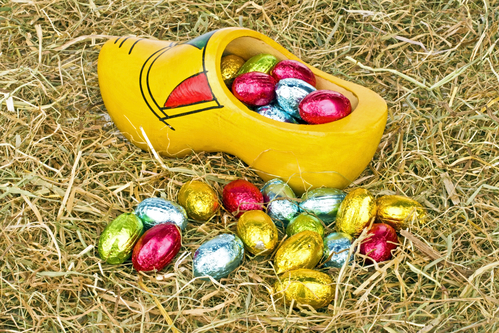From Easter to Eid al-Fitr: Nine significant events in two months


This year April and May include no less than nine significant events on the Dutch calendar – and in normal years, a lot of excuses for a party. Schools are also closed for a week or two around the end of April for their spring break but if you are crafty with the public holidays, you hardly need eat into your official holiday entitlement.
Pasen
This year, Easter (Goede vrijdag, 1e and 2e Paasdag) take place over the first weekend in April. The Dutch are very keen on Easter eggs and spring-related decorations, and many homes will put up willow branches hung with tiny wooden eggs. Easter Monday is a public holiday but Friday is a normal working day, apart from for government workers.
Don’t forget, the Netherlands has a Paashaas – Easter hare – rather than a bunny.
Pesach, or the Jewish Passover, also ended on April 4 this year.
Ramadan (starts April 13)
Ramadan is the ninth month of the Islamic calendar, observed by Muslims worldwide as a month of fasting, prayer, reflection and community. The fast is broken every evening with a communal evening meal or Iftar – but that has been scuppered this year by the one-visitor rule as part of the coronavirus restrictions.
Koningsdag (April 27)
April 27 is birthday of king Willem-Alexander, who decided to ditch the Koninginnedag – Queen’s Day – celebrations and make them his own. April 30 was the birthday of queen Beatrix’s mother, Juliana and Beatrix when succeeded her mother in 1980, she decided to keep the celebrations on that day.
Traditionally citizens do not need a permit to sell goods on the street on Queens Day which is why Amsterdam turns into a giant flea market – but not this year, of course, because of the coronavirus restrictions.
Dodenherdenking (May 4)
Remembrance Day commemorates all civilians and members of the armed forces who have died in wars or peacekeeping missions since the outbreak of World War II.
The main wreath-laying ceremony takes place at the National Monument on Dam Square in Amsterdam, which is usually attended by the king and other royal family members, ministers, and military leaders. At 20.00 hours there is a two minute silence.
This year, like last year, the ceremony will be without the crowds and just a few dignataries, but will be no less moving for it.
Bevrijdingsdag (May 5)
Liberation Day celebrates the end of the occupation by Nazi Germany during World War II. Events kick off in Wageningen – where the German capitulation was signed – and the Liberation flame is lit shortly before midnight.
In a normal year freedom festivals are organised all over the country. Again, like last year, this year’s festivities will be online. Every five years, Bevrijdingsdag is an unofficial public holiday but that happens next in 2025.
Moederdag (May 9)
In the Netherlands Mothering Sunday is always the second Sunday in May, as it is in America and many other countries. This is the day when all Dutch people visit their mums and take them flowers – Covid permitting. If it is sunny, Moederdag is a good day to go to the beach because everyone is visiting mum.
Suikerfeest (May 12)
Known as the ‘sugar feast’ in Dutch, the holiday of Eid al-Fitr is a time to dress up, give gifts and eat lots with family and friends to mark the end of Ramadan. The Dutch name for Eid al-Fitr is thought to come from the Turkish Şeker Bayrami, which means sugar feast. Again the day may not be as sweet because of Covid restrictions.
Hemelvaartsdag (May 13)
A public holiday in the Netherlands, Ascension Day marks the day the resurrected Jesus was taken up to heaven in the presence of eleven of his Apostles. Lots of people take Friday off as well, to create an extra long weekend – which often can be worked into the May school break.
Pinksteren (May 23)
In the Netherlands, 2de Pinksterdag, or Whit Monday, is a public holiday. The Pinkstergemeente – or Pentecostal church – is an evangelical Protestant grouping with around 120,000 followers in the Netherlands.
Thank you for donating to DutchNews.nl.
We could not provide the Dutch News service, and keep it free of charge, without the generous support of our readers. Your donations allow us to report on issues you tell us matter, and provide you with a summary of the most important Dutch news each day.
Make a donation